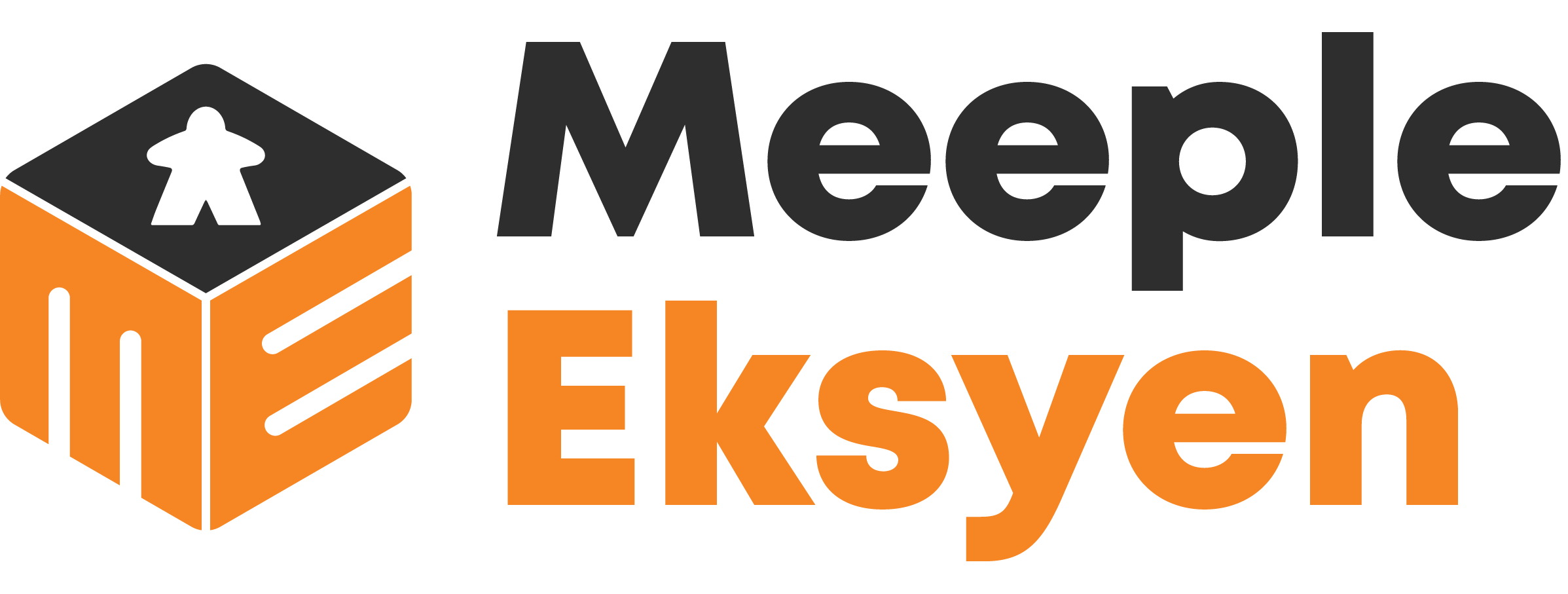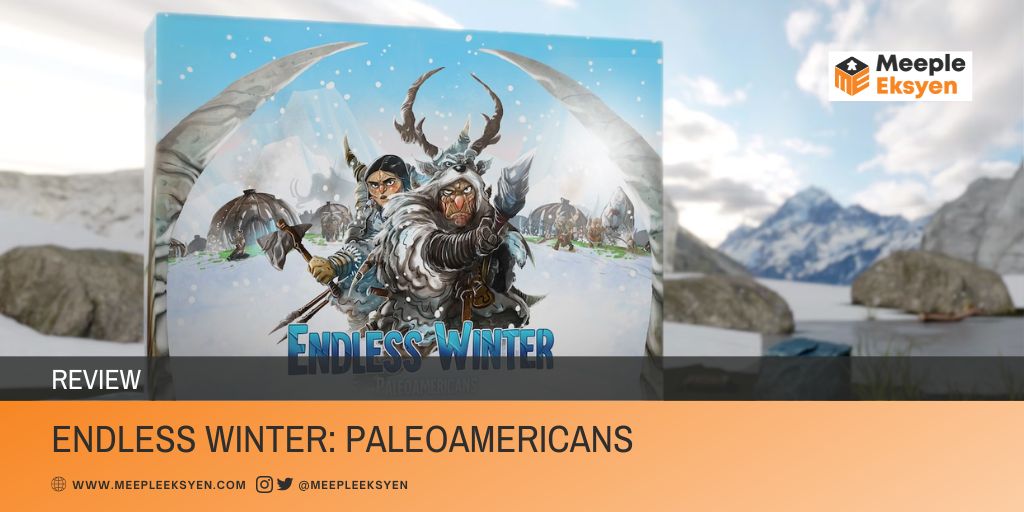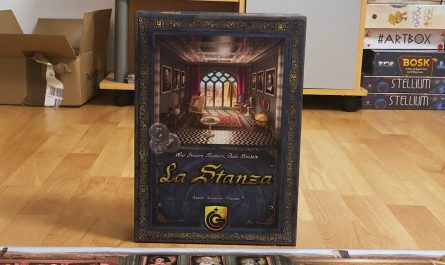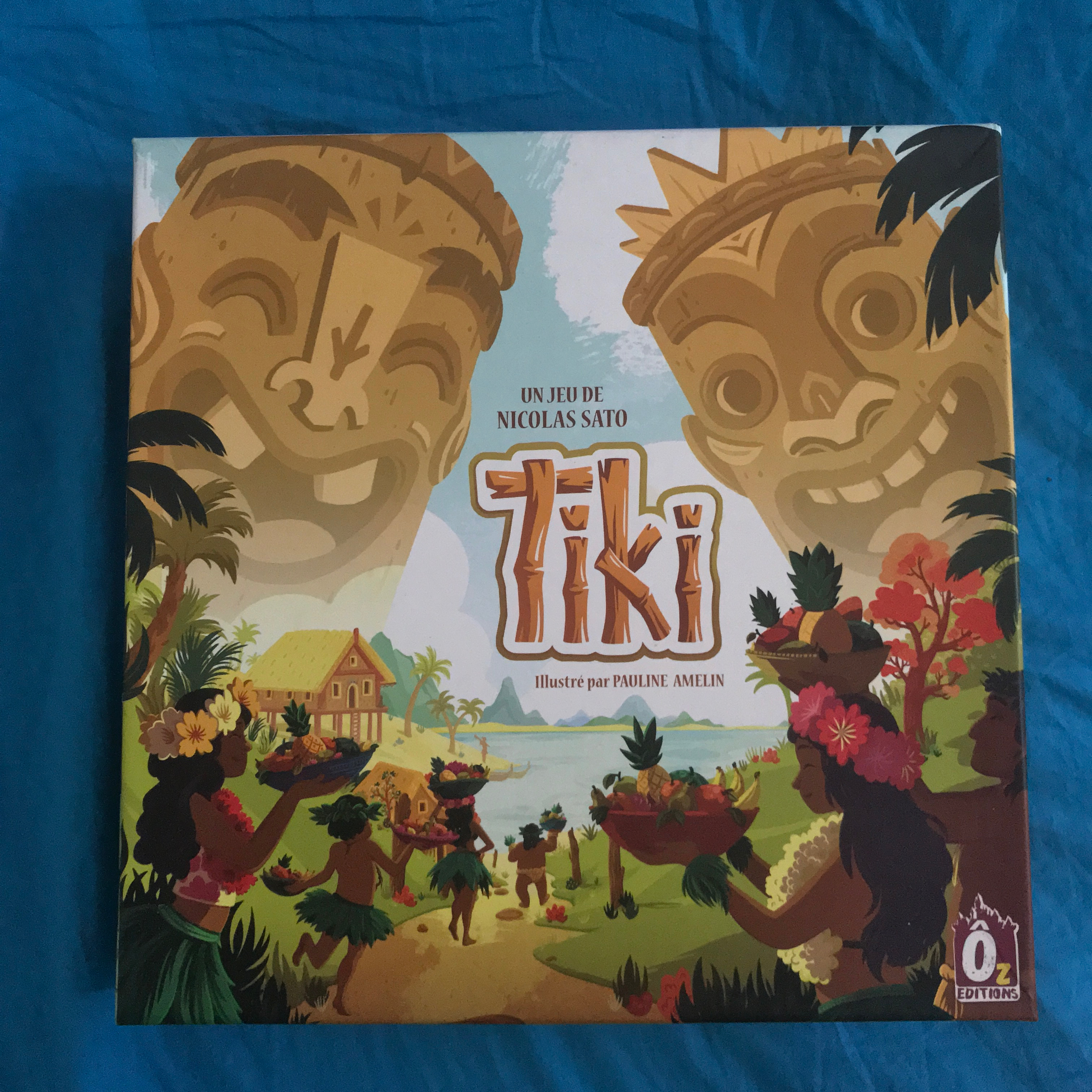The Paleo-Indians were the first inhabitants of the now-America, living during the final ‘ice age’ period of the Late Pleistocene. Endless Winter: Paleoamericans carries their spirit as its theme and background story, settling in the harsh condition with their tribes. This game was funded on Kickstarter in 2020 — all backers recently just got it in their mailboxes.
This game is at the top of my ‘Most anticipated games in 2022.’ The reason is obvious — two of my favourite board game people, Stan Kordonskiy (designer) and The Mico (Mihajlo Dimitrievski, the artist) joined forces to create Endless Winter: Paleoamericans. I can finally say, “Finally, it’s here!”
To be frank, this game has been our number one priority to hit the table, the second it arrived at my door step. Very unfortunate, one item was missing for the Red Monolith resin components. Hence, I must put the game on ice (pun intended) — Flamecraft and its soothing warmth was enough to entertain us, but not for long… The coldness called us — Endless Winter was too tempting. Ergo, we took the default component for the red player. It was unsightly, but I survived.
What is Endless Winter: Paleoamericans?
Endless Winter is a euro game, definitely. It contains a few mechanics, which seamlessly supporting each other to create a solid game. There is this worker placement mechanic, with deck-building and area control, too. Besides, we will also find hand management, set collection, and the end-game bonuses as well. There’s nothing new under the sun —and so are these mechanics are not something brand new. But, the perfect combination of them all constructs a unique and new game to enjoy.
Before we carry on the gameplay (after praising the mechanics that much), I need to address the elephant in the room: the production quality. Endless Winter pampered us whilst we unwrapped the plastic shrink. It feels nice, even only by touching the cover. The snowy part comes extra with rough texture, and most of the artwork is swathed in embossed treatment and UV coating. Unboxing the game also delivers another surprise: you will be welcome by the Mammoth, along with the tribe leader and his troops. I also appreciate the plastic tray to contain all the components, including the expansions and modules. Coming with the individual player tray, it is functional and can cut the setup time significantly.
Endless Winter comes with miniatures, pre-painted ones to be exact. Despite only getting washed/shaded, it really brings the detail out of the tribe leaders. The stern-looking chiefs really show the harsh condition to live during the last ancient ice age. Complimented with the artwork from The Mico, it really brought us to the jarring cold tundra. Saying that his illustration in this game has become his Magnum Opus is definitely not an understatement.
REMARKS ON THE GAMEPLAY
To give more context after the brief explanation above: there are three phases and four golden rules in Endless Winter. The Action (1) phase starts with playing Culture cards, placing the minis to trigger an action, and discard the cards to the Discard pile. Then, the card preparation (done in secret) for the Eclipse phase can occur after three turns. Players count and compare the Labour icons showing on the prepared cards in the previous stage for the Eclipse (2) phase. This is the crucial moment — it defines the players’ turn order for the next round and which bonuses they gain. Afterwards, the effects with Eclipse icon will be fulfilled. The Preparation (3) phase is like the cleaning and recovery phase, where we refill cards in all decks and hands.
Two out of four golden rules are pretty common in any other game. One is we only shuffle back from the Discard pile to refill the deck — and two is the existence of different icons, distinguishing which one is for the in-game and end-game scoring. The other halves are much more interesting. For instance, the lesser benefit — whenever we obtain an in-game benefit, we can opt to another subsidiary benefit. The rank ranges from: building one Megalith > drawing one card > gaining one Idol > gaining a Tool > gaining one Food.
Fantasia Games and Stan did a good job to keep the micro-rules to a minimum. It makes the game more intuitive and flowing. Overall, Endless Winter’s rule is simple, yet the gameplay is prone to Analysis Paralysis. Refills for both Culture (to develop) and Animal (for food) card piles must wait until the next round, making it scarce. The latter one is an intriguing aspect — when the tribes deplete the Animal cards, then they need to spend Labour to discover and hunt in the new Animal Ground. Not only the resource, the spot to build our Village is also pretty meagre. Hence, the most nimble tribe would get the privilege to settle at the most strategic location. We could feel the cut-throat area control in Endless Winter.
Both aspects above make sense, and fit the thematic background perfectly. And those are the triggers of this Analysis Paralysis, too. Each player need to settle their priority in this frigid ice, not only to survive, but to thrive with their tribe.
A priority dilemma also occurs when picking one out of the four Action. The first one to take that action (Initiate, Develop, Migrate, and Hunt), gets the bonus accordingly. It may not be much in some cases, but that can turn the tides when we get the bonus at the right time.
Endless winter — how did it fare?
Firstly, I think we need to address that the game is well-balance. As one of the best things since sliced bread, nothing in the design is created so overpowered throughout the game. To be the winner, one must take his/her actions as efficient as possible. No wasteful act shall remain in this tundra, unblessed with bountiful resources.
The rulebook is well-articulate and easy to understand. The explanation comes with illustration, which is helpful when crunching all the information within. I won’t complain, as this is more than adequate.
We talked about settling priority, it does not mean that all stones are placed — Endless Winter is miles away from the definition of rigid and definite. All players have their freedom to choose and settle their action priority. For example, it is necessary to play the right Culture card, at the right time to achieve a goal. Knowing when to spend Food or cards to get Labour, and which card to prepare for the Eclipse phase to be the first player in the player order and get the bonuses — these are another cases in point.
The cards in Endless Winter are multi-functional. It can be used in both Action and Eclipse phases, but that does not mean we cannot focus only on one aspect, though. There are some cards that bring boosters and additional effects when doing one of them — this is pretty useful when we specialize our strategy in one of the phases.
I don’t really worry about the replay value of Endless Winter. The core game is already a solid game, that’s for sure. With numerous modules and a few expansions already at hand, I guess it will entertain us for a long time. The expansion shifts the hex tiles and adds more Animals for the in-game scoring, which carries more variation into the game. Some mentioned that the River and Ancestor expansions are the most renowned and must-try ones.
If I may nitpick, I would whine at the actual size of the game. Endless Winter requires immense space to play. Very fortunate that I read the campaign page thoroughly — after knowing the dimension, I pick the two-part playing mat.
Verdict
One recommendation worth mentioning: implement the Rest Action and Glacier Token modules in your first game. While being the first player to take the Rest action, we get a bonus — just like any other actions. The Glacier token also provides a one-time benefit when building a Village in the Glacier hex. It gives extra incentives when investing the resource in this area.
TL;DR, I love this game. Endless Winter is the best piece from Stan Kordonskiy — and The Mico for the artwork. If you are a fan of worker placement, this game you must try. Yes, you read it right, for me, this game leans more to the worker placement category than a deck-building one.
Do you love board games as much as we do? Support us!
Thank you for reading our articles! If you enjoyed our work and want more captivating board game contents, make sure to:
👉 Follow us on our social media — you can find us on ![]()
![]()
![]() Click one of the icons to land on our social media, or find us @meepleeksyen there, it’s just a click away! Stay updated with our latest board game reviews and previews by following us on those platforms 📱👍
Click one of the icons to land on our social media, or find us @meepleeksyen there, it’s just a click away! Stay updated with our latest board game reviews and previews by following us on those platforms 📱👍
💬 Do you have contrasting opinions? Leave a comment — share your thoughts with us, we’d love to hear (or read) yours! Have you played this game before? Did you have something similar as well? Or perhaps, something more personal, like what are your favourite board games? Let’s discuss in the comments below!
🙏 Support Us! Your generous support can help us produce even better content in the future. If you love what we do, consider making a donation to our blog. Every contribution counts and means a lot to us! You can either donate locally with Indonesian Rupiah (IDR) via Trakteer ![]() or for international readers with another currency through Buy Me a Coffee
or for international readers with another currency through Buy Me a Coffee ![]() It helps us to survive, too! 💰 Click one of the button below 👇
It helps us to survive, too! 💰 Click one of the button below 👇
I’ve been a gamer my whole life. I got introduced to modern board games in 2019, and since then, I’ve been in love. My goal is to reduce the ratio of unplayed board game in my collection to zero. But, I blame Kickstarter for making it an impossible mission.





